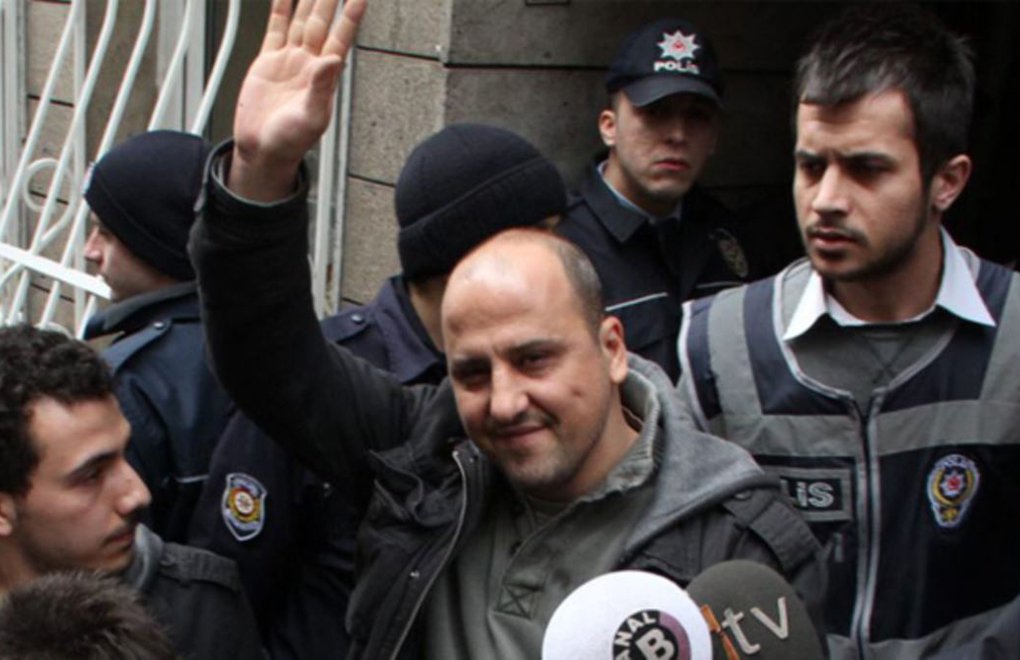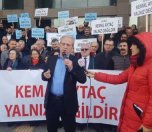Click to read the article in Turkish / Kurdish
The European Court of Human Rights (ECtHR) has ruled that freedom of expression and the press of Ahmet Şık, a journalist and an independent MP, was violated.
Şık was sent behind bars during a "terrorism-related" investigation against several executives and journalists from daily Cumhuriyet and had been remanded in custody for 14 months.
He and other defendants in the case were eventually sentenced to prison but the Court of Cassation overturned the verdict.
Concluding another application by Cumhuriyet employees, the ECtHR ruled on November 10 that their rights were violated.
In yesterday's (November 24) ruling, the ECtHR stated that Şık's rights were also violated and he should be paid 16,000 Euro for compensation.
The decision taken by seven votes to one stated that the first and fourth paragraph of Article 5 of the European Convention on Human Rights (ECHR) on the right to freedom and security and Article 10 on freedom of expression were violated.
It pointed out that the journalist was imprisoned in the absence of reasonable suspicion of disseminating propaganda in favor of terrorist organizations or assisting them, through newspaper articles and interviews and social media posts.
Dissenting opinions
Saadet Yüksel, an ECtHR judge from Turkey, stated a dissenting opinion regarding the judgment of violation of Article 10. Some interviews made by Şık were not the subject of freedom of the press, according to Yüksel.
"... In my opinion, it is premature to rule on those charges and there was no need to examine separately the interference with Article 10; accordingly, I do not agree with the majority's conclusion as to the violation of Article 10 of the Convention. In the light of the above, I consider that it was unnecessary to examine this complaint separately," she stated.
Also, Judge Egidijus Küris repeated his partly dissenting opinion from the previous case concerning Cumhuriyet, stating that there was also a violation of Article 18 as the charges against the journalists were of a "political nature."
Article 18 states, "The restrictions permitted under this Convention to the said rights and freedoms shall not be applied for any purpose other than those for which they have been prescribed."
The Constitutional Court ruled on May 2, 2019, that Şık's rights and freedoms were not violated with his arrest.
Şık: The decision is ostensible
Şık criticized the ECtHR judgment on Twitter, saying that "The ostensible decisions given by the ECtHR is a guarantee to the palace regime, which usurps the legal security of those who are not with them or those they regard as enemies."
The reputation of the ECtHR is not different from Turkey's judiciary, he said.
What happened?
Executives and journalists from Cumhuriyet were detained on October 31, 2016, for committing a crime on behalf of the Kurdistan Workers' Party (PKK) and the "Fethullahist Terrorist Organization (FETÖ)" without being a member of these groups.
The İstanbul 27th Heavy Penal Court sentenced 15 defendants to a total of 81 years and 45 days in prison while acquitting three people.
Cumhuriyet Executive Board Chair Akın Atalay was acquitted of "malpractice" and sentenced to 7 years, 3 months and 15 days in prison for "aiding an illegal organization". Orhan Erinç was sentenced to 6 years and 3 months, Murat Sabuncu to 7 years and 6 months, Kadri Gürsel to 2 years and 6 months, Güray Öz to 3 years and 9 months, Musa Kart to 3 years and 9 months, Aydın Engin to 7 years and 6 months, Hikmet Çetinkaya to 6 years and 3 months, Ahmet Şık to 7 years and 6 months, Mustafa Kemal Güngör, Hakan Kara and Önder Çelik each to 3 years and 9 months, Ahmet Kemal Aydoğdu to 10 years, Emre İper to 3 years 1 month and 15 days in prison on the charge of "aiding a terrorist organization". Bülent Utku was acquitted of "malpractice" and sentenced to 4 years and 6 months in prison on the charge of "aiding and propagandizing for a terrorist organization".
As the defendants were released over the course of the trial and after a decision was given, the defendants who were given a prison sentence of less than five years were sent to prison on the grounds that they didn't have the right to apply to the Court of Cassation.
The Court of Cassation overturned the local court's decision due to the lack of tangible evidence and ruled that the defendants should be acquitted. After it stated that the files of those who were sentenced to less than five years in prison should be considered together with other defendants, they were also released.
The İstanbul 27th Heavy Penal Court defied the Court of Cassation ruling. (HA/VK)







aa.jpg)